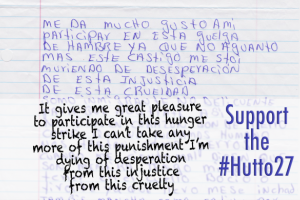
Women prisoners, almost exclusively Central American and Mexican, at T. Don Hutto Residential Center in Taylor, Texas, recognized Thanksgiving by engaging in a hunger strike, both in their own name and in solidarity with largely Bangladeshi hunger strikers in Alabama and California. It’s a small world after all, in the global gulag of asylum seeker and refugee detention.
The stories of the women intersect with the story of T. Don Hutto and of the current U.S. regime. T. Don Hutto opened, as T. Don Hutto Family Residential Facility, in 2006. From the outset, it was a nightmare. Finally, after three years of prisoner protests, supporter protests and law suits, the government decided to shut it down … sort of. In 2009, T. Don Hutto was `transformed’ into a women’s immigration prison, and it’s been a special hell for immigrant women. The Correction Corporation of America runs T. Don Hutto, and they must be very proud of it, since they named the facility after T. Don Hutto, one of the company’s three founders.
The U.S. Immigration and Customs Enforcement, or ICE, is equally proud of T. Don Hutto: “The T. Don Hutto Residential Center (TDHRC) represents a unique and pioneering setting, offering the least restrictive environment permissible to manage persons in administrative U.S. Immigration and Customs Enforcement (ICE) custody. In keeping with the director’s call for civil detention reform, TDHRC represents a clear departure from historical detention settings. Residents experience expanded services that include free and open movement, recreational and educational participation, food services and medical and mental health care. TDHRC’s person-centered philosophy guides every interaction with the residents by understanding the often complex circumstances surrounding their detention. TDHRC continues to fulfill the mission of ICE while at the same time recognizing and valuing the dignity of the individual.”
Over the Thanksgiving weekend, over 100 mostly Bangladeshi prisoners Etowah County Detention Center in Alabama, Theo Lacey Facility in Orange County, California, and Otay Detention Facility in San Diego went on hunger strike. Behind them was another Bangladeshi women’s hunger strike.
In October 54 South Asian women started a hunger strike at ICE’s El Paso Processing Center. Five days later, 14 Indian and Bangladeshi women began a hunger strike at ICE’s La Salle Detention Facility in La Salle, Louisiana. La Salle and El Paso hold women and children.
At the time Francisca Morales Macis, a Mexican domestic abuse survivor, was being held at T. Don Hutto. She heard of the hunger strike, and started her own. Within days, over 100 women were on hunger strike. The women described horrendous conditions, including extraordinarily long waits for adjudication. The average wait in the Houston immigration court is 703 days. Francisca Morales Macis and Amalia Arteaga Leal, a Honduran refugee, were identified as the chief organizers of the hunger strike. Both were peremptorily transferred to the South Texas Detention Center, in Pearsall, Texas. South Texas Detention Center is an overwhelmingly male detention center. ICE says this was not retaliation because there was no hunger strike. How could there by a hunger strike in a person-centered institution?
According to Amalia Arteago Leal, “They brought us here from the T. Don Hutto detention center because there was a hunger strike there. Many people were protesting because we want our freedom. We have spent a lot of time appealing our cases, and we are not receiving answers, and when they call us, they always tell us that they are postponing us or giving us other dates, and the truth is, we’ve spent a lot of time in detention and we can’t tolerate this much time … I think that it’s unjust that they have detained us for so much time, because I think we have the right to bond. We came to seek refuge, and instead we found punishment. What I want people to understand is that they should support us, because it’s true that we have entered the United States for a second time, but I want to apply for bond. I’m on strike because I want my freedom. I can’t tolerate imprisonment anymore, because I am between four walls and I think this has a psychological impact. We come from our own country with our problems, and many times, we can’t get out of these problems — we’re trapped, imprisoned — and now, we’ve come to another form of imprisonment. For me, I think it’s an injustice.”
The women in T. Don Hutto know the truth. It’s a prison, where `person-centered’ treatment ranges from abuse to torture. Shut it down, today. Set the women free now. It’s way past time.
(Photo Credit: Grassroots Leadership / Twitter / Colorlines)